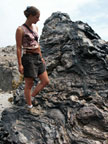
July 17 6-7pm Room 705 on-campus. Sign-up's, pay camping fee, and orientation. Note, we'll discuss the option of moving the trip to Friday-Sunday instead of Thur-Saturday. This would be far better astronomically, and also remove some conflicts people may have with e.g. final exams with other summer classes.
Aug 2 5pm-7:30pm or so. Room 705 on-campus. Pre-trip meeting. Carpooling, distribute maps, who-brings-what, followed by planetarium show and lecture on the solar system with emphasis on comets, meteors, and meteor showers.
7pm. Have your tent set up and be ready to start dinner preparation. I'll bring pasta and sauce and salad makings. You can help by bringing along a vege or two which we can mix/match into our meal plan.
9pm-11pm - Telescope session studying Jupiter, the star formation regions of the summer Milky Way.
11pm-? - Lay out our sleeping bags and sip hot chocolate while we log meteor counts. I'll lecture on the constellations, with laser pointer, to aid in your meteor logs.
8am - Begin prep for my famous French crepes breakfast. You'll help by carving fruit while I prepare the batter. It'll be a leisurely breakfast in the cool early morning.
9:30am - We condense ourselves into fewer vehicles and caravan to a selection of locations which will allow us to study planetary science up close.
Locations we'll study include: Twin Lakes, Buckeye Hot Springs, Travertine Hot Springs, and ancient pre-cambrian rock along the base of the Sierra. We'll study the formation of calcium carbonate rock in thermal springs, and the chemistry of hot springs.
7pm - Convene for dinner back at camp. Heavy on carbs and spices to power us through the evening
8:30pm - Talk briefly around the campfire about the meteor observing plans and cover questions about the day's planetary science
9:00pm - Observe at the telescopes the wonders of the summer Milky Way. Star clusters in Sagittarius and Aquila, star formation regions in Scorpius and Sagittarius, dying stars in Lyra and Vulpeculae.
10:00pm - Begin our Perseid watch! Log meteors, look for early evening "Earth grazers" which cross the entire sky!
Sunday
8am - Another tastey breakfast creation
9:30am - pack up camp and prepare for our excursions. We'll head back to Mono Lake and make stops to study the tufa towers, and then to Panum Crater, which is an incredible recent volcano of obsidian glass and pumice (at right: a geology student at Pahnum Crater). I'll pass out the final exams here.
noon - Head back over Tioga Pass. Stop just past the entrance station and study the alpine meadow. And, one more stop at Tenaya Lake where we can study Cathedral Peak and take a few pictures. I'll discuss the glaciation history of the region and how it accounts for the peculiar shape of Cathedral Peak compared to the domes of Toulemne Meadows.